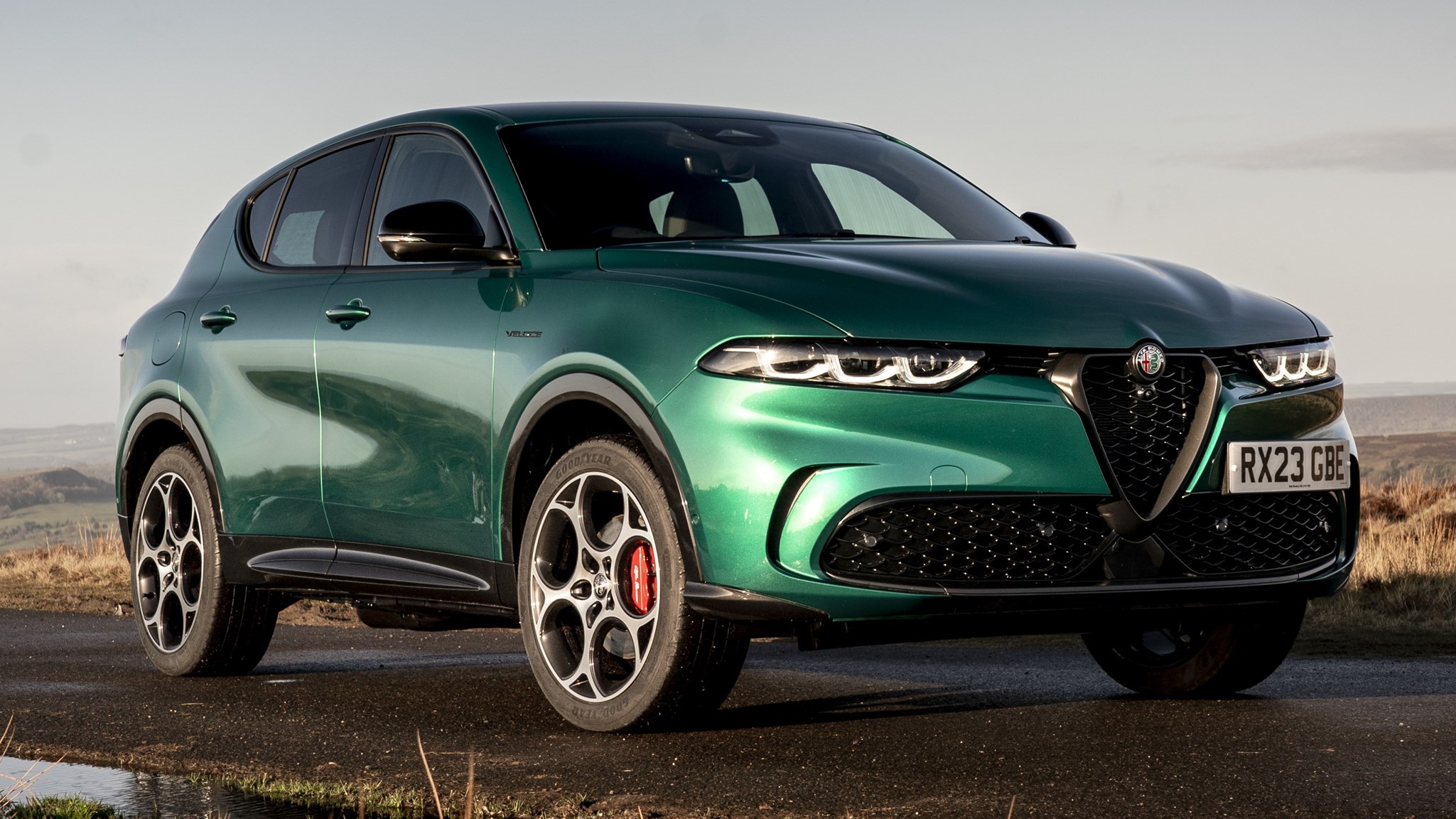► Alfa’s new compact SUV – now with MHEV or PHEV power
► Produces 280hp and can drive 40 miles in EV mode
► On sale in the UK now from just over £38k for entry-level mild hybrid
This is the new Alfa Romeo Tonale – the brand’s first ever compact SUV. It’s also the first in Alfa Romeo’s century-and-a-bit history to embrace electrification, ahead of its first full EV due in 2024. That means it’ll lead the charge for Alfa’s ambitious plan to become an electric-only brand by 2027.
So here’s a car that’ll tackle heavy hitters such as the BMW X1 and Volvo XC40, available with either mild hybrid or plug-in hybrid powertrains, but that still has to deliver on that quintessential Alfa DNA that loyal customers expect.
These are very bold moves for Alfa Romeo. Before the launch of the Stelvio in 2017, the company had never built an SUV and, right up until the Tonale was launched in September 2022, it was still championing a non-electrically assisted 2.9-litre V6 as the go-to option for its performance cars.
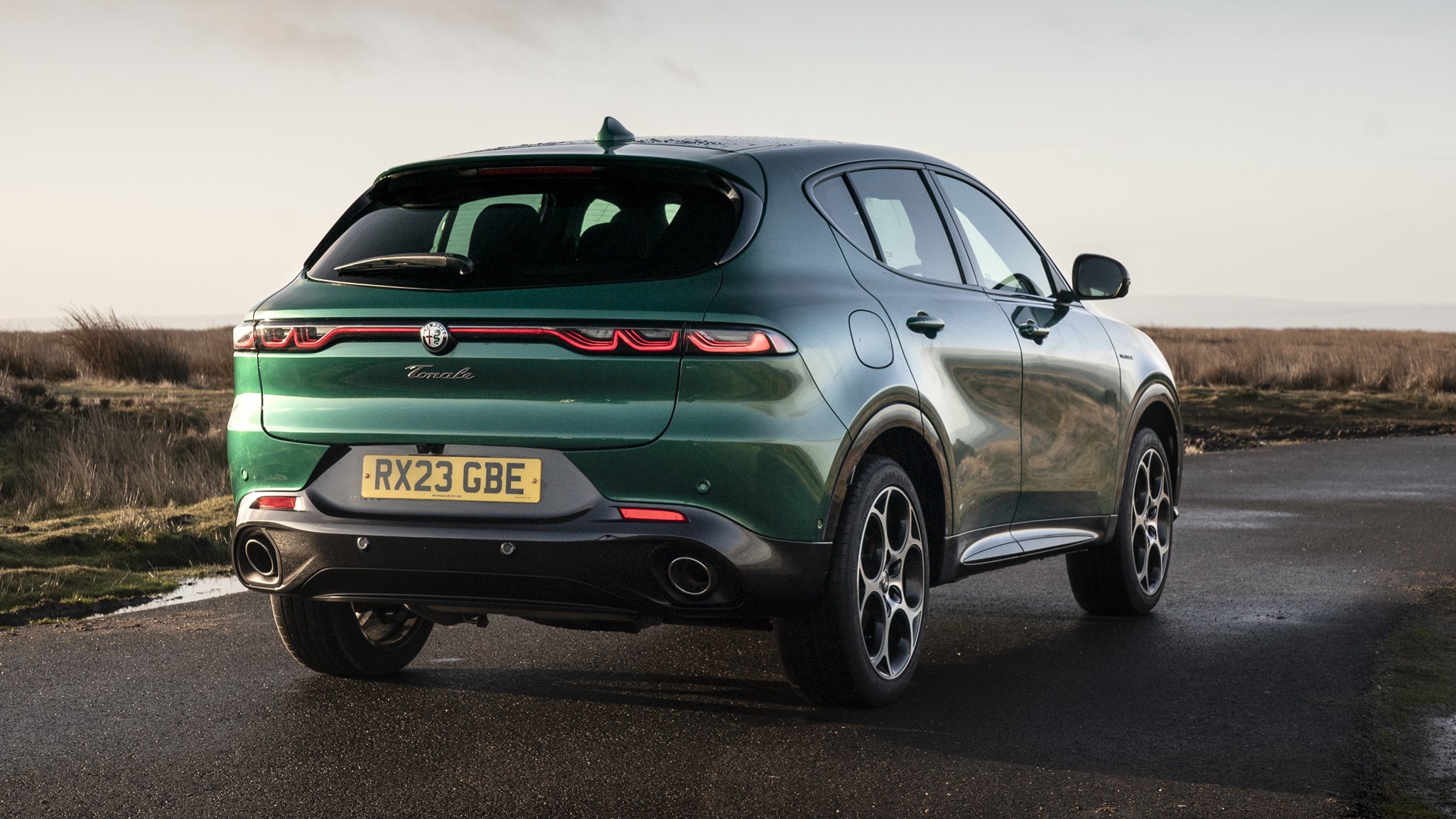
But times are changing. The upcoming replacement for the Alfa Romeo Spider is expected to feature a pure-electric powertrain; the firm’s next supercar project will bid farewell to the brand’s iconic V6 engine and the most potent version of the Tonale is powered by a PHEV system. The question is, has this rapid pace of change made Alfa lose sight of its roots?
Well? What’s the hybrid system like?
If you’re expecting the Tonale’s new electrified engines to exhibit the same sort of character as Alfa Romeo’s old TwinSpark units, you’re sure to be disappointed. The cheapest option we get in the UK is a 158bhp 1.5-litre petrol-hybrid unit, complete with a seven-speed automatic gearbox and a 20bhp electric motor.
It’s loaded with clever technology, such as dual variable valve timing and a variable geometry turbocharger which alter the rate of airflow through the inlet housing to help the engine respond faster at lower speeds. The electric motor can also send up to 100lb/ft of torque into the driveline, which makes the car feel rather sprightly at full throttle.
The Tonale’s hybrid system has another trick up its sleeve. Unlike its mild hybrid rivals, it can propel the car on electric power alone. It can trundle forward in queues and manoeuvre at low speeds without ever calling on the combustion engine, which is a neat trick. Exciting, though, it is not. It feels strained at high revs and suffers the occasional odd clunk or surge in power that suggests it’s not quite as well tuned in to the automatic gearbox as Alfa would like it to be.
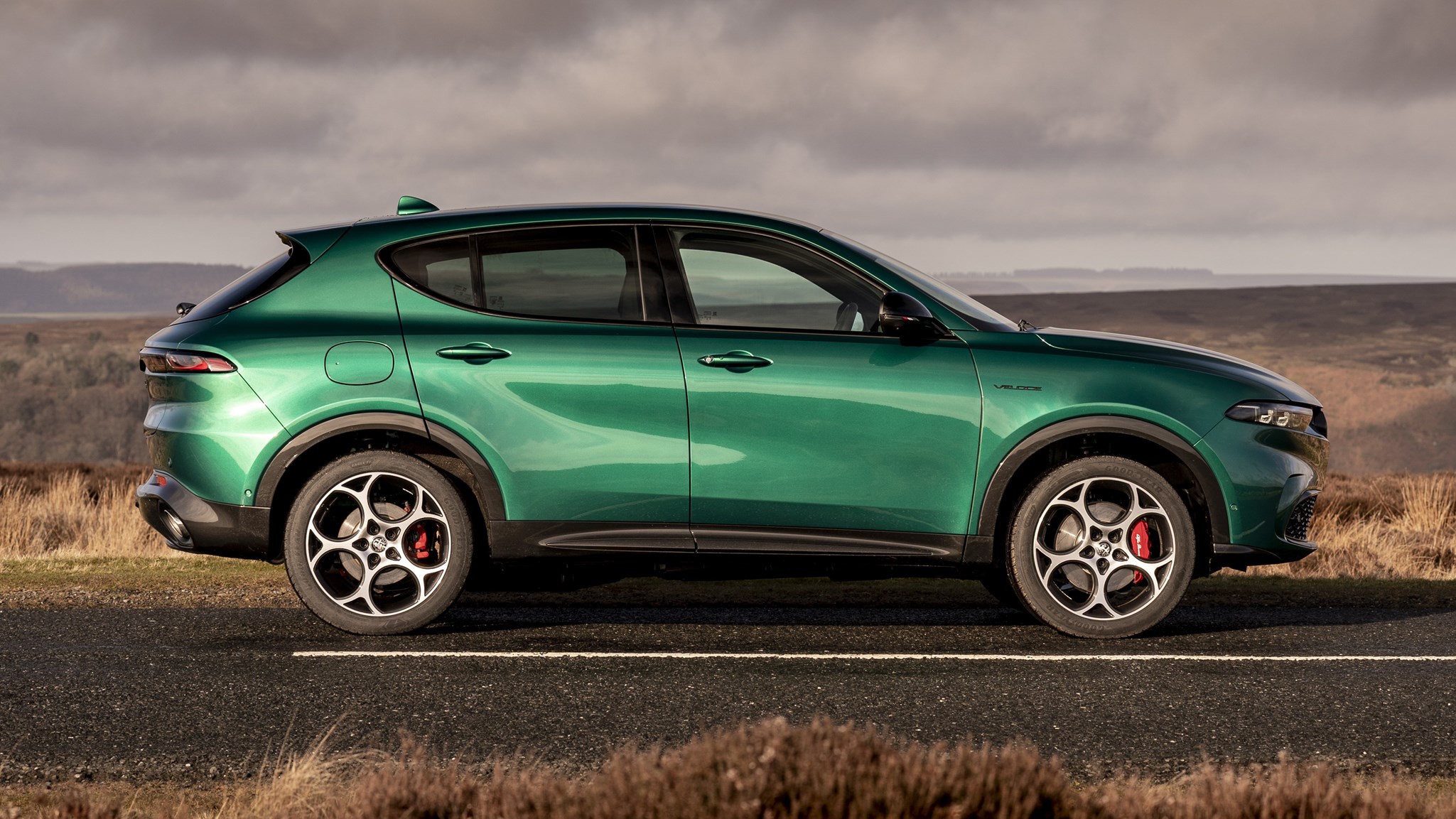
If Alfa Romeo is to be believed, it’s also quite an efficient unit. The company says the Tonale will return between 44.8 and 49.6mpg on the WLTP test cycle, with CO2 emissions ranging from 130 to 144g/km of CO2. In comparison, a BMW X1 18i manages up to 44.8mpg and 142–146g/km of CO2 – and it’s almost a second slower in the 0–62mph sprint.
Is the PHEV system better?
We reckon so, but here it’s a numbers game rather than an emotional one. The PHEV is smoother than the mild hybrid, managing the changeover between electric and combustion power with greater finesse. There’s still a slight hesitation from the petrol engine if you ask for a lot of power from a crawl, but it’s more polished overall.
The Tonale PHEV is also lot faster. The system comprises a turbocharged 1.3-litre four-cylinder petrol engine driving the front wheels and an electric motor powering the rear, for a combined output of 276bhp and a 0–62mph time of 6.2 seconds. It never feels quite that fast or that powerful, though, and even less so when the battery’s discharged.
Alfa Romeo makes some bold claims about the Tonale PHEV’s efficiency figures. With a full charge in the battery, the company says the system will return upwards of 200mpg. We managed to extract around 40mpg from the powertrain during our drive, on a mixed route of about three hours and a hundred miles.
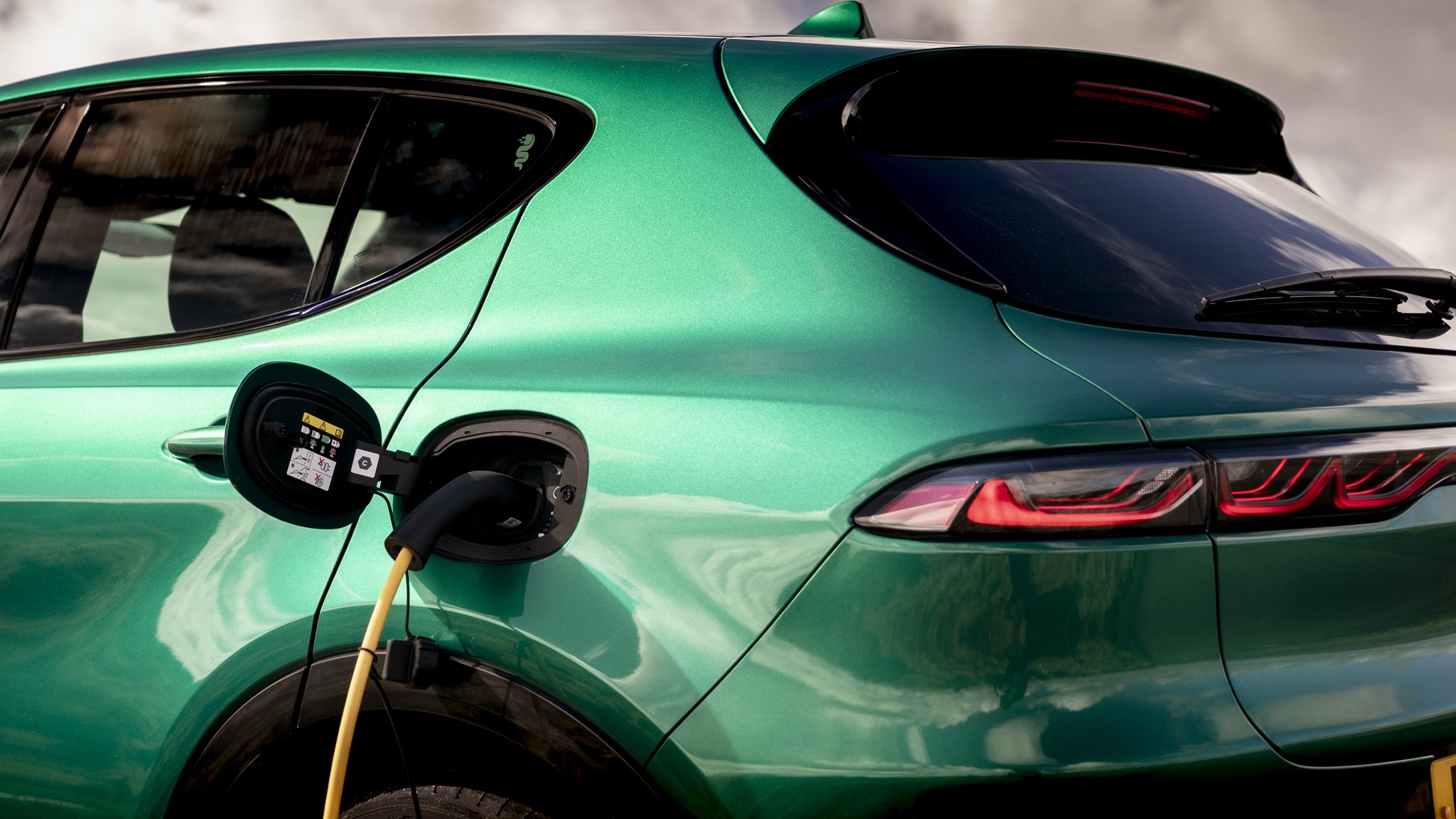
Alfa also says the Tonale PHEV can drive for up to 43 miles on electric power alone, which puts it well ahead of the 28 miles Volvo claims for the plug-in-hybrid-powered XC40. It also puts it in a lower tax band for company cars, which might mean for the first time in a long time you can ask your fleet manager for an Alfa without their eye twitching.
The battery pack is a 15.5kWh unit which takes just 2.5 hours to full recharge using the car’s onboard 7.4kW charger which is also better than the Volvo.
And how does the Tonale feel to drive?
It’s a little hit and miss, but the overall experience is positive. We’ll start with the bad and work our way up to the good. The steering takes some getting used to. Like all Alfas, it’s incredibly direct, but there’s far too much assistance at urban speeds. As a result, the steering feels very light and insubstantial and doesn’t offer much in the way of feedback. It never firms up enough at faster speeds, either.
The body is suspended by MacPherson struts all round, with sporty Veloce cars coming as standard with trick dual-stage active dampers. They’re comfortable when the car’s operating in normal mode, but have a reassuringly harder edge in dynamic mode, which is better suited to hard cornering. On our Veloce test car (complete with 19-inch alloy wheels), the softer damper setting soaked up bumps well and isolated the cabin from the worst of UK roads.
Cheaper Ti cars have Koni frequency selective damping, which hydraulically switch from a sporty to comfort for high frequency bumps. Alfa has a reputation for judging its passive dampers setups well – and the Tonale’s is no exception. The last 15% or so of comfort is missing compared with the adaptive setup, but it’s a strong effort for the standard suspension.
One final word on comfort. The mild hybrid powertrain’s fiendishly complicated nature means it can sometimes act like several different powertrains rather than one coherent unit. It most noticeable when you’re crawling around town – if you lift off the throttle for a junction then suddenly call for power again to exploit a gap, the Tonale can sometimes punish you with a spike of revs and a shunty gear change. That makes the car tricky to drive smoothly at slow speeds.
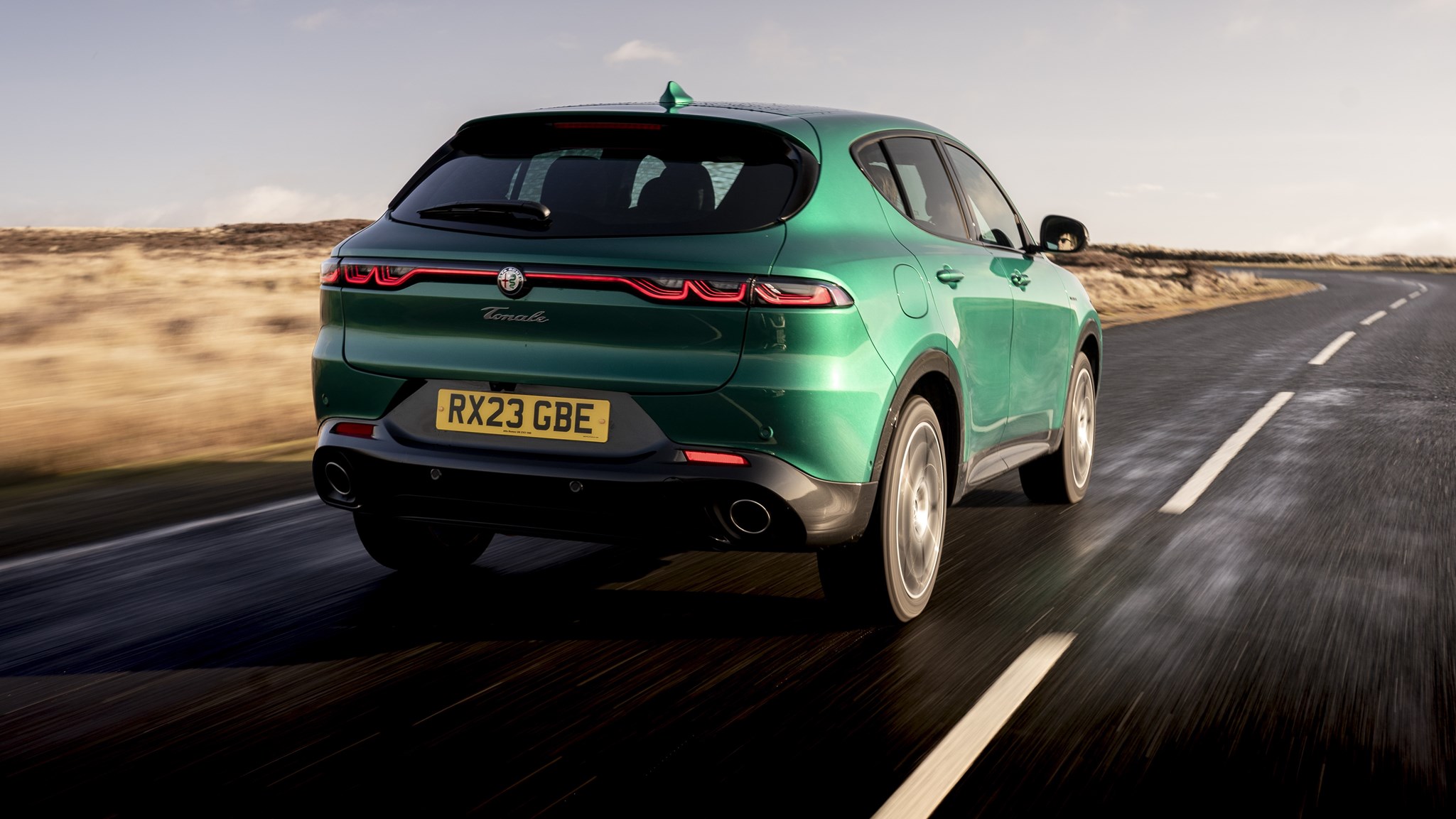
In typical Alfa fashion, though, these problems recede when you get the hammer down. The firm’s engineers boast of the Tonale’s dynamic superiority over its X1 arch-rival around their Balocco test track, thanks in part to its stiff chassis bracing and wide tracks. The company also says the front and rear axles respond more quickly to than the X1 in the corners – and, having mercilessly thrashed the Tonale around Balocco ourselves, we can say with confidence that there’s truth in the claims.
The Tonale is at its best on fast, cross-country roads. The steering is still too light, but its directness is great on the tight and technical roads around Richmond in North Yorkshire – and, when you’re driving quickly, the notches in both powertrains are masked well. You can throw the car at corners and it’ll cling on steadfastly, quelling both understeer and body roll admirably. The front axle also has dynamic torque vectoring, which brakes the inside wheel to keep the nose tucked in.
The PHEV model is better still. We whipped it around Alfa’s Balocco test track and were floored by the amount of grip available. Understeer is almost imperceptible – when the tyres do start to give up, it’s the rear end that rotates first. You get also four-wheel drive, thanks to the electric motor on the rear axle and, because of that, Alfa’s torque vectoring system works on all four wheels. That meant we could barrel around the track constantly nipping at the heels of the Giulia pace car ahead.
What’s the cabin like?
Pretty, at least on the face of it. There are lashings of design flair, from the beautifully backlit strip across the dashboard to the unusual wheel-mounted starter button and stunning aluminium paddle shifters. The driving position is fashionably lofty, but the raised centre console hem you in and makes the cabin feel sporty.
Some of the plastics are little mediocre. The B-pillar on our UK test car was already scratched by the seatbelt buckle, despite the fact it had only covered a couple thousand miles. The switch on the centre console for the hybrid system and parking assistance also feel rather cheap – but the new 10.25-inch touchscreen looks gorgeous. It responds very quickly and can even be linked up to Amazon Alexa to allow you to check things like your car’s fuel level from home.
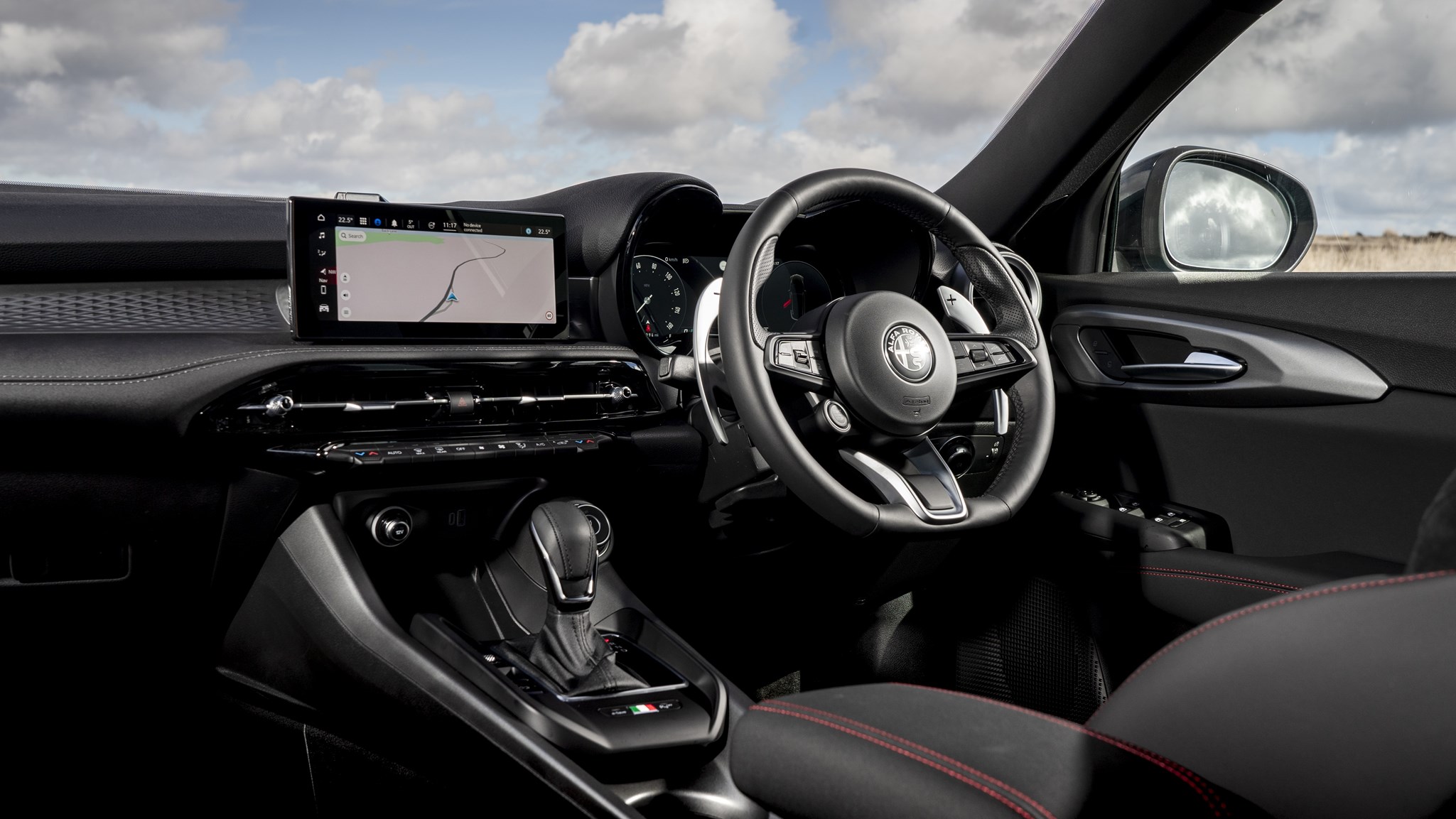
Rear-seat passengers have plenty of leg and headroom, but those up front may find the footwells a little too narrow (which is standard Alfa fare, unfortunately). The boot on the mild hybrid model is a good size, though, at 500 litres – and if you fold the rear bench flat, that figure increases to 1550 litres. That’s 50 litres more than the Volvo XC40 and only 40 less than the BMW X1.
Standard equipment for the cheapest Ti model includes 18-inch alloy wheels, a gloss black body kit, parking sensors, a rear-view camera and Apple CarPlay and Android Auto. The pricier Veloce spec gets 19-inch alloys, red brake calipers, privacy glass and some extra aluminium trim inside.
In a world first for the car industry, the Tonale’s service history is also backed up by NFT technology. Items like its maintenance records and battery pack condition are stored off the vehicle, in the cloud. Alfa says this makes it much harder to forge the SUV’s records, which should help to preserve its residual values.
Verdict
The Alfa Romeo Tonale is pretty, practical and properly put together. It’s also loaded with safety equipment and features an infotainment setup that’s easily as good as those from rivals like BMW, Audi and Mercedes. Like a true Alfa, it’s also great fun to drive quickly. Also like a true Alfa, it has the most appeal to those who value character and experience over economy or pragmatism.
We have a few major sticking points with the car. The mild hybrid powertrain really lets the side down because of how jerky it is. We suspect it’s largely a calibration issue, but it spoils the low-speed driveability. The PHEV is smoother and more powerful – but suffers from a short range, so-so economy and just not being quite up to the standards of its more established rivals.
The steering is also massively overly assisted and completely dead to the touch – but this improves slightly as you build speed. Don’t let these foibles deter you, though. The Tonale is a breath of fresh air in the stagnating compact premium SUV segment and we still think it’ll make you smile every time you drive it.
